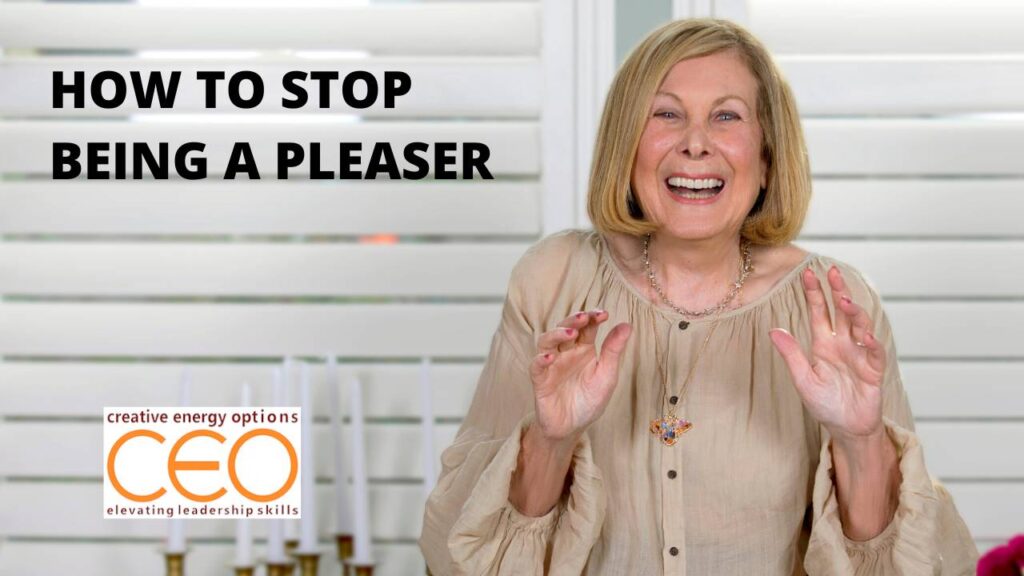
Summary: Why is it hard for so many to say NO? If it means people are upset with you, what can you do? Here are some ideas to stay calm and not be derailed by your insecurities.
Dear Dr. Sylvia,
Many of my executives complain that they are exhausted and feel overwhelmed because they can’t say no. I want to help enhance their leadership skills and request your help.
For example, when there are issues with conflict or someone is not performing up to speed, they say, “Don’t worry, I’ll take care of it.”
Then there is frustration and resentment because they take on more than their fair share.
The worry is even worse now. The executives feel like they have to handle all the issues around returning to the office in person.
What leadership skills are needed when you shake your head left to right, meaning “no,” and yet, out of your mouth comes a “yes?”
Thanks for your help.
Signed,
Wants to Help
Dear Wants to Help,
Most importantly, get ready for new ways of responding.
Above all, ask your pleaser pattern people to pay attention.
Pleasers need leadership skills to understand why the word NO sticks in their throats.
I have a big question for anybody who’s a pleaser, lives with a pleaser, knows a pleaser.
BIG QUESTION: Do you usually respond by saying “YES” because you care, or do you say “YES” because you want to be accepted?
First leadership skill: Find out the WHY in your YES.
There’s a big difference between these two ways of responding. Until you understand the WHY of your YES, you will feel like a captive in a never-ending Netflix drama.
For example, I teach that “NO’ is a complete sentence!” and people laugh.
Further, I have recently added a short sentence for those of you who need more than just the plain old, “no.”
It would help if you underlined this: While NO is a complete sentence, the key to being heard is when you stop and do not defend, explain or justify.
Even when you can say no and mean it, the tendency is to give qualifiers. So, stop!
Please don’t add more information at this point. You can leave out the “Because it costs too much, or because there is no time, or it will upset others too much.”
Second leadership skill: Get rid of your whining or mooing.
On the other hand, often, “NO” comes out more like an exclamation than a question. When you dare to say that dreaded two-letter word, Pleasers sound like a mooing cow, and the word comes out “nooo?”
So, again the question, “Do you say “YES” because you care, or do you say “YES” because you want to be accepted?
As I worked on my “Stress Busters” program, I figured out something important.
I don’t know why it took me so long, but I figured it out. Now, pay attention, all you pleasers. This borders on life-changing.
Third leadership skill: Does saying NO means you don’t like me?
Many pleasers can’t say “NO” because they think it’s impolite. They think it’s harsh. I agree. Saying no can be unpleasant.
I thought long and hard and created the “Not for Me Process.” This method is like strength training. You have to practice till you get comfortable lifting the heavy weights.
Learn the “Not for Me Process” to stay calm and secure.
You have to practice until you finally say the honest “NO” and mean it so people will listen.
Can’t get the word “No” out of your mouth
If somebody says, “Will you take on a new project?” you want to say “NO,” but you think that’s impolite. Or “Are you making dinner tonight?” You want to say, “No, you have two hands. You make dinner for a change.” Yet, you think you are disappointing someone.
Fourth leadership skill: Begin by saying “Thank You.”
We want to be polite, right? Here’s the polite way. When somebody says something, the first thing you should do is to say, “Thanks or thank you.” That’s polite.
Get “polite” out of the way and keep going.
You will say, “Thank you,” and then say a significant sentence. Here is where you get the advantage and let go of your guilt.
Fifth leadership skill: Here’s the Big sentence, “That doesn’t work for me right now.”
You say, “Thank you, this is just not the right time for me.” Or “Thanks, that doesn’t work for me now.”
I promise that you will be able to say it with more conviction than just telling a plain “NO.”
Once you do that, it frees something up.
It’s time to let go of those horrible feelings of guilt, overwhelm, and obligation. You’re just going to say, “Thank you, that won’t work for me right now.”
It’s better than just that brutal “No.”
Pleasers, I promise you, once you use this magical sentence, you will have more freedom and more energy for things you love to do instead of just the word NO.
Here’s to your success.
Sylvia
PS. Take the Leadership Success Quiz to find out if you are a pleaser or which other personality pattern it’s time for you to transform. You’ll get some great ways to upgrade your leadership skills.


